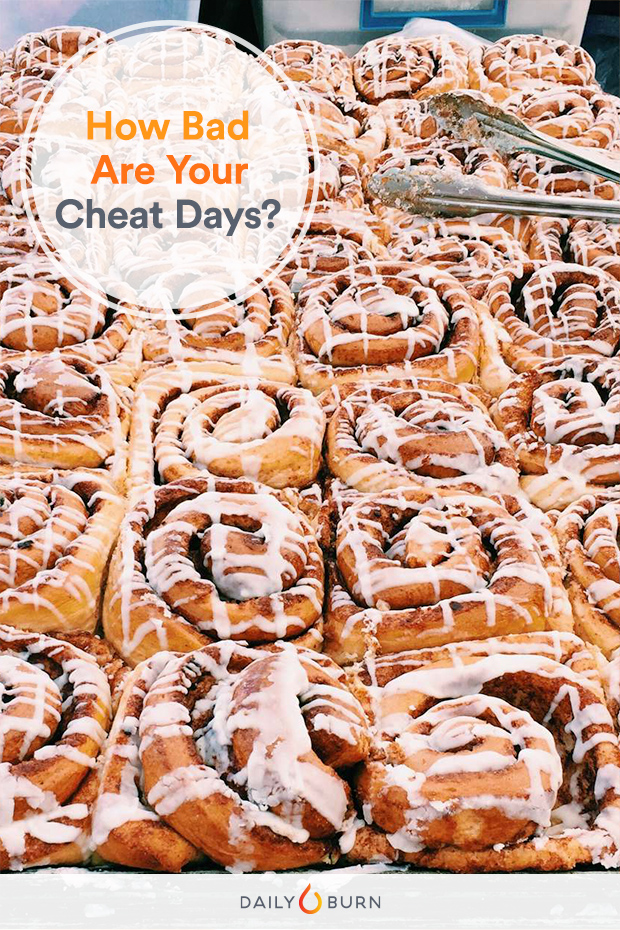
Between Friday night pizza, Saturday burgers and beers and Sunday morning waffles, it’s easy to get carried away with your weekend cheat days. But if you chow down on salad Monday through Friday, are you still in the clear? Maybe not, according to one recent study.
Researchers from the University of New South Wales decided to examine the effects of weekend binging on, well, a group of rodents. And it turned out that three-day-a-week junk food splurges caused similar changes in gut bacteria and metabolic hormones as eating unhealthy 24/7.
So do you need to trade in your beer-and-pizza weekends for yoga and salads? We checked with the study author and a dietitian to find out.
RELATED: When Is It OK to Cheat? The Pros and Cons of Cheat Days
How Weekend Binges Might Impact Your Body
Here’s what went down during this study: Researchers fed rats healthy food four days a week, followed by unlimited junk food on the weekends. They even ate cake, cookies and meat pies, to mimic human diets. Other groups of rats were fed consistently healthy, or unhealthy diets, as a means of comparison.
Turns out the weekend “partiers” and the rats that ate a consistently unhealthy diet both had a similarly limited variety of gut bacteria, or microbiota — which could be a bad sign for their well-being. “The gut bacteria are really important because they have a role in harvesting nutrients and they’re important in immune function,” says study author Professor Margaret Morris, the Head of Pharmacology for the School of Medical Sciences at the University of New South Wales. “A good gut has a lot of diversity, and [it’s] producing a good variety of nutrients.”
RELATED: 9 All-Natural Sources of Healthy Probiotics
Even worse: The yo-yo dieting rats weighed 18 percent more than the healthy eaters! And their insulin and leptin levels were somewhere in between those of the rats that ate either totally healthy, or completely unhealthy foods.
When the body has trouble producing or using insulin properly, this can lead to dangerously high sugar levels in the bloodstream, causing diabetes, according to the NIH. Leptin, on the other hand, is the hormone that tells our body when to stop eating, explains Professor Morris. The heightened levels found in the weekend-bingers suggest that the rats had become leptin-resistant; their brains were no longer receiving their bodies’ signals to stop eating.
RELATED: I’m Exercising More — So Why Am I Gaining Weight
What Does This Mean for You?
So, are the effects seen in these rats really comparable to what happens when you let loose on the weekend? Yes and no. “We can’t say we know how humans respond until a study with the same design is conducted with humans subjects,” says Jennifer Major, MS, RDN, a registered dietitian nutritionist and health coach at Noom. (While it may sound appealing to eat unlimited junk food in the name of science, it’s easier to test this kind of thing on rodents first.)
“However, what several studies have shown is that foods high in fat, sugar, salt or a combination of these, are extremely satiable and potentially addictive,” she notes. That means that our brains, like the rats’, may tell us to keep eating junk food even when we’re not hungry.
RELATED: Overindulged? Here’s How to Get Back on Track in 24 Hours
Luckily, all this doesn’t mean you have to give up weekend treats for good, Major says. But the more frequent and intense your exposure to salt, sugar and fat, the worse the impact on your health, she says. Professor Morris echoes this sentiment, noting that the weekend binges in the study were a consistent habit, and the amount of food the rats were eating was extreme. (When left to their own devices, the rats consumed 50 percent more calories from unhealthy food than healthy food.)
“I don’t think having an odd weekend out is going to harm people,” says Professor Morris. “It all comes down to moderation. If you eat healthy foods every day, a little junk won’t have an impact.”
RELATED: How to Detox the Healthy Way: 16 Recipes You’ll Love
3 Ways to Rein in Cheat Days
Your Saturday and Sunday treats don’t have to slide into full-scale junk food fests. Check out Major’s tips for practicing that ever-elusive feat of moderation.
1. Be prepared.
Plan in advance when you’ll indulge. “In just thinking about an indulgent day or meal beforehand, you’re much more likely to feel in control of the situation when it occurs,” she says.
RELATED: 20 Meal Prep Tips from the Best Preppers We Know
2. Indulge selectively.
Just because it’s the weekend doesn’t mean you have to say yes to every treat that comes your way. “If your friends order cheesecake at the end of dinner, and it’s not your first choice, or even your second, consider passing on it. There will be more desserts that are worth it in your future.”
3. Go halfsies.
Split those large or calorie-laden portions with a friend or significant other. You’ll get to enjoy the dish, but you won’t be able to clean the plate all by yourself, Major advises.
In short, enjoy your indulgences — just avoid making every weekend a junk food free-for-all.
